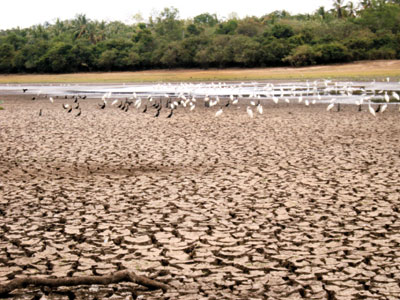Poverty alleviation programmes in the past have failed
Since independence governments have failed to alleviate poverty though there has been many programmes. This was revealed by Jayantha Wijeratne, Additional Secretary to the President on Sustainable Development at a media briefing held in Colombo last week to explain the “Unilever, UNDP (United Nations Development Programme) and UNGC (United Nations Global Impact) Initiate Strategic PPP’s Around 2030 Agenda”.

Drought-affected rice fields like this increase the need for social welfare.
Jorn Sorensen, UNDP Sri Lanka Country Director said that they were commencing a new move to connect businesses with governments and development partners to achieve the sustainable development goals and thus create an environment to unleash the potential of the private sector because investing in sustainable development is a win-win.
He said that they have considered the private sector as an important strategic partner for UNDP in achieving its vision to help countries eradicate poverty and reduce inequalities and exclusion within broader sustainable development. He indicated that the UNDP is to be a catalyst in convening the relevant stakeholders to support Sri Lanka achieve sustainable human development, because strong partnerships help them deliver stronger results that improve people’s lives.
He said that now they have moved one step further with the UNGC (UN Global Compact) to help Sri Lanka to achieve its sustainable development goals and said that they have Unilever so this is a new movement they started and work with the government in a policy environment. By connecting business, he said would help the potential of the private sector. When government understand the businesses, the businesses understand the government and everyone, he pointed out.
Meanwhile Mr. Wijeratne said that since independence there were many poverty alleviation programmes and though there was some sort of development they didn’t fully succeed.
Therefore, he said that the government has initiated the ‘Gramashakthi” movement and President Maithripala Sirisena appointed a Cabinet Sub-Committee which submitted proposals to eradicate poverty from Sri Lanka. They have identified 1,000 Grama Niladhari Divisions with poor families and among them 700 are below the poverty line.
The earlier thinking was that the public sector was the sole authority to eradicate poverty, but, he said that they have now realised that the government should be monitoring, policy making and facilitating while the responsibility should be with the people and the private sector. Towards achieving the goals he said that they had several discussions with the private sector.
Carl Cruz, Chairman, Unilever Sri Lanka said that the country’s 2030 sustainable development goals cannot be achieved through any single party, but leaving their comfort zones and work together to help the nation realise its vision. In civil service and business long lasting positive change could be achieved by mobilizing collective action, he indicated.
Dr. Rohan Fernando, Chairperson, UNDP Sustainable Development Strategy, Aitken Spence Ltd said that sustainability from a private sector point of view is all about doing good business and being committed to ensure that they achieve the objectives of the treble bottom line – people, planet and profits.
Though sustainability issues are daunting, when there is partnerships, collaboration and unison of mind this daunting task appears to be very meaningful, because, that is an advantage everyone has, he pointed out. He said that sustainability is an integral part of the country and its economy.
He said that a large portion of the population live on tea and if it is grown in a manner that is not sustainable there would be a negative impact on the employees and when they are taken to the customers overseas they would find that this industry erodes and loses its competitiveness through the years.
He indicated that the biggest challenges many companies face today in agriculture and others, is the impact of global warming and climate change. Therefore, sustainability of tea is of prime importance to ensure that they make their tea plantation and the tea companies connected sustainable.


